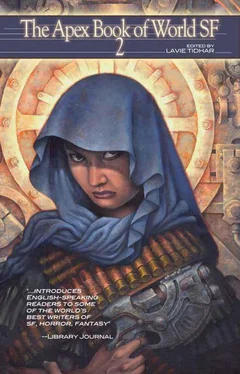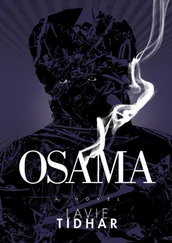“Go.”
Eyo grabbed hold of Katulo’s arms and tried to pull him up.
“Just go.” He said the words harshly.
The wind blew the door shut after Eyo had left.
Katulo sat there for a long time. His only movement was the rise and fall of his chest. Inhale. Exhale. Inhale. Exhale. His mind was only partly in the clinic. The rest drifted into the past as it did when he was performing a Waking. His muscles sagged, pulling down his bones with their weight. Sweat made his clothes stick to him. His head span. An hour passed.
The door flew open. Chama ran in. He was gasping. “You have to come.” He saw Katulo was still on the ground and his face filled with shock. He repeated himself. “You have to come. Osati was at Chama’s father’s house. When he found out, he started shouting and people came to listen. Then… They are going to Bujumbura.”
Katulo was still not responding.
“Chama’s father. He opened the police station. He gave them guns.”
Katulo looked up now.
“They said they will take Chama’s killers by force.”
Katulo could see it as clearly as if it had already happened. There would be shouting and screaming. The police would be called. The mob would be angry, scared, and carrying guns. The police would be nervous, angry, and carry guns. Someone would shoot first. It wouldn’t matter which side. There would be a death, Hutu or Tutsi. And that would just be the beginning. It would begin in Bujumbura and spread to the rest of the country. Rage, beatings, killings, accusations, running, hiding, homes being burnt down…things that people swore would never happen again. And he could do nothing.
“You have to come,” Eyo said for a third time. “Please.”
And what can I do? Eyo was looking at him with so much hope. Eyo, who symbolised his own hopes to pass on the skill of Waking. “I will come,” he said at last. His skills as a healer would be needed.
He got up. “How long ago did they go?”
“I ran here. They were on the way to the police station.”
“We won’t be able to catch them but if we hurry we will arrive in Bujumbura just after them.”
Katulo wished there was a car they could take but the only car in the village had no gasoline. Burundi’s petrol reserves had run dry over a decade ago. Katulo accepted Eyo’s help to stand up. He and Eyo collected up his medical supplies and stuffed them into a leather bag. Katulo went to his house and packed the extra bandages he kept underneath a closet. Beside the boxes of medicines, he saw a machete. He used it occasionally to garden behind his house. It made him think of Chama’s wound, the catalyst for the violence that was sure to happen later. He picked up the machete and stuffed it into the bag.
Osati and four hundred and seventeen men and women from Azamé village were shouting in Bujumbura’s streets by the time Katulo and Eyo arrived. They were demanding the killers of Chama be brought in front of them. Twenty of them were carrying guns and the rest had rakes, machetes, spades and broom handles. Osati was standing on top of a cart shouting, “We want them. Bring them out.”
There were hundreds of other people there, too. “Go away, you Tutsi scum,” Katulo heard someone shout. There was a group of Bujumbura citizens facing the villagers. Many of them were also carrying makeshift weapons. Osati tried to make his way through the entropy. His walking stick was knocked from under him. He started to fall but Eyo caught him and the wooden staff. They continued through.
A shrill whistle sounded. It announced the arrival of a third group. The police. They were wearing riot gear and holding up batons. A few were holding up guns. One of them spoke through a megaphone. “Go home, go home now.”
The presence of the police added more volatility to the already tense masses. Unease rippled through the mob. Eyo shouted something but Katulo could not hear him through the din. Katulo saw a woman whose son he had treated for tonsillitis, crouch. She had two sons, a six-year-old and a ten-year-old. When she stood up, she was holding a stone. She flung it and it struck the side of a face. In response, a wooden pole rose and was brought down on the head of a Tutsi villager. Beside the man the pole had struck stood a man with a gun. He pointed it. The trigger was squeezed. The bullet tore through the shoulder of the man holding the pole.
Katulo reached into his medical bag. He had wished it would not be necessary but this was only the beginning of the bloodshed. Soon, people would begin to die. There was only one thing Katulo could do. His hand was trembling. He grabbed the hilt of the machete and he pulled it out. He opened himself to the land. He felt the streets around him and reached into them. He pulled out the past. In his mind, he was fourteen years old again, out of breath and desperately afraid his father was dead. He was sprinting down that school corridor again, with every step getting closer to those terrible sounds: shrieks and gurgles and wails. At the end of the corridor, opposite a sign that said “EMERGENCY EXIT”, there was a half-open door. Katulo looked in and he saw a pile of bodies. They were tiny, frail children’s bodies stacked up like bricks of flesh and bone. The children who were still alive were standing in a line and clutching each other. Katulo saw his father and the other men walking down the line. He saw his father push a uniform-clad six-year-old Hutu to the floor and swing his machete. He did not slash her only once. He lifted it again and then brought it down over and over again. Hacking.
The revulsion and confusion Katulo had felt returned to him. He had run away. He had hidden in the forest, wept alone, and then returned home before nightfall. He did not mention what he had seen. When he saw his father again, he hugged him and pretended he had not been there. He had never mentioned that day. He had decided never to let that memory control him but now he had to let it. It suffused him. But the memory was not enough. Katulo had never killed so the land could not Wake unless…
His fingers tensed against the machete’s hilt and with an abrupt swipe he brought the blade down against Eyo’s neck. He saw shock in Eyo’s eyes for a split-second and then the blade crushed his apprentice’s throat. Blood sprayed and dripped down the blade onto his clenched fingers.
All around Katulo, people gasped. Suddenly, smoky figures had appeared in their midst. Most Wakings called a few. Forty or fifty spirits was the most Katulo had seen at a Waking. But the streets of Bujumbura were deeply scarred. Wounds that had been closed and ignored for seven decades ripped open. Screams deafened Katulo and all around, echoes of viciousness were reanimated. Hundreds of spectral men appeared in the streets strangling each other, lashing bare backs with vine whips, stabbing, shooting and rejoicing. Near one wall, a vague figure lifted a baby and smashed its head against the wall. On the floor in front of some Azamé villagers, a man in a soldier’s uniform raped a woman with the sharp end of a kitchen knife. The living watched with horror.
The Waking was not restricted to the streets. Throughout Bujumbura men and women saw monstrosities. In a bar, laughing patrons were choked into silence when six figures materialised in front of them. Five of them stood around a single man and were beating him mercilessly. In one house, a couple’s conversation was interrupted by the appearance of a man kneeling on the floor with his face in a mound of dung. Behind him, another man was laughing and pressing a gun against his temple. There was a loud bang and the kneeling man died.
There was blood, so much blood. The living could smell it so strongly they could taste it. They felt the rage and desperate lust for revenge consuming the awakened spirits. Some of the living ran to escape the horrors they were witnessing, but in every street they ran into there was more. Old pain and old death celebrated at being rekindled. Forgotten cruelty ran rampant.
Читать дальше












